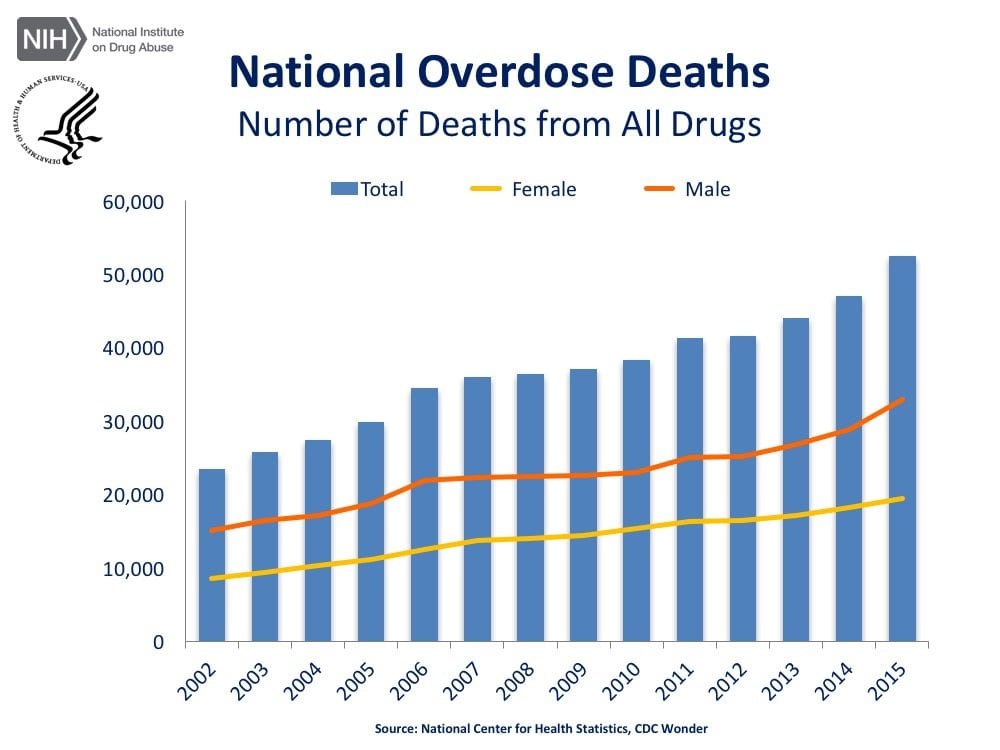Yearly Drug-Related Death Toll Overtakes Road Accident Stats and Peak AIDS Deaths
In a recent post, Stillman and Friedland noted that deaths due to drugged driving have overtaken drunk-driving numbers. In this post, we will take a look at drug deaths overall. Today, drug deaths now outnumber road deaths. In fact, yearly drug death statistics have now surpassed the peak yearly death rate from the AIDS epidemic (51,000), with 52,404 drug deaths in 2015:

Tennesseans are directly impacted by this lethal wave of addiction and death. We took a look at the statistics available at the Centers for Disease Control (CDC) to see how our state is affected. From 2014-2015, the death rate in Tennessee jumped 13.8%, one of the U.S.’s higher rates of increase. Total overdose fatalities in 2015 in Tennessee were 1,457, or about 22 deaths per 100,000.
What drugs are causing these deaths? At current rates, you may know already from personal experience, but here the Chicago Tribune lays out the facts:
Heroin deaths rose 23 percent in one year, to 12,989, slightly higher than the number of gun homicides, according to government data released Thursday.
Deaths from synthetic opioids, including illicit fentanyl, rose 73 percent to 9,580. And prescription painkillers took the highest toll, but posted the smallest increase. Abuse of drugs like Oxycontin and Vicodin killed 17,536, an increase of 4 percent.
Americans consume about 80% of opioids manufactured world-wide. Heroin deaths are linked to prescription abuse: 80% of heroin users started out using opioid pain medications which require a doctor’s prescription. We have a problem that we must solve, because at these rates no American will remain untouched.
We hope that the leveling of prescription drug deaths reflects the start of consumer pushback against pill-pushing doctors. However, it is also possible that tightened control over the dispensing of opioid prescriptions has pushed more addicts toward cheaper and easier-to-obtain illegal drugs.
As personal injury attorneys, we have seen that accidents may cause long-term pain and suffering. While we understand that people want pain relief, we have seen that the use of opioids:
- Does not solve the underlying cause of the pain
- Creates its own new and potentially lethal set of problems
We hope that patients and families are becoming more informed and elect to restrict heavy pain medication to the immediate post-trauma period in hospital. If your pain is not manageable with over-the-counter painkillers, you need to go back to your doctor or physical therapist, or get a new one.
Another strategy which you can use in tandem with OTC pain meds is to try an anti-inflammatory diet. Stress-reducing tactics, including gentle exercise like yoga and walking are also beneficial. While pills may be the easy way out, that “out” may become more permanent than you or your loved ones would ever choose.
We work hard to get our clients fair compensation. It is up to the doctors and other health practitioners to work to provide real treatment to help their patients, but patients must also demand better and more comprehensive solutions, not just an opioid prescription that numbs them and may ultimately kill them.






